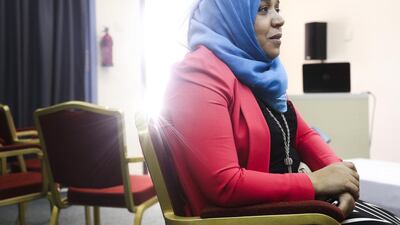DUBAI // Arbia Slama knew her son was making progress when he finally looked into her eyes and strung a few words together.
One of 20 autistic children recently accepted at an autism facility in high demand, Chahin’s condition is finally improving.
But the process has not been easy. Chahin was among 260 children on the waiting list, and it was only after an arduous journey that the Slamas were able to enrol him at the Dubai Autism Centre (DAC).
After a series of doctors visits, Chahin received an autism diagnosis at age five. The first time the family contacted DAC, there was only a place for Chahin on the waiting list. The Slamas had to resort to other more costly centres.
The family faced continual setbacks, from unexpected financial demands to sudden cancellations,
“It’s like they only take children for business, based on how much you pay, on how much you have,” Mrs Slama said. “These children are human beings that need help and support to improve. It should not be treated as a business transaction, but a human right.”
Mrs Slama called DAC again, this time in tears. Fortunately for Chahin, the centre was expanding and it put the boy on a priority list. A few days later, he was enrolled.
The family’s story echoes those of hundreds of families across the UAE who feel shortchanged when it comes to options for early intervention.
Estimates from a 2009 report by the New England Centre for Children show there are about 7,000 autistic children in the UAE. But experts say the number is conservative, based on previous international prevalence rates of between 1 in 150 and 1 in 200 children. The latest international rate is 1 in 88 children, and experts believe the UAE numbers are similar.
Sarah Ahmad Baker, head of community service at DAC, said she has witnessed the increase on the ground. In 2007 the centre found 43 children with autism. Last year, there were 110. Although awareness plays a big role in the increase, other factors still under research are also at play, from changes in the environment to genetics.
Even getting an accurate diagnosis can present a challenge on its own, Mrs Baker said.
“Even paediatricians, unfortunately, would guide them wrongly. For example, if he’s a boy, they might attribute it to his gender and say he’s a boy, boys are late in development.”
Waits for diagnostic consultations at the centre are long, averaging two to three months. To help relieve the wait, the centre teamed up with the Dubai Health Authority to provide an internationally recognised screening tool called the M-Chat, where nurses at primary health clinics provide parents a checklist to pick up alarming signs. The list affects children between the ages of 18 months and 32 months.
Hayula Mourad, business support and communication unit head at DAC said expanding the centre’s capacity from 40 to 60 children was not easy.
“It is extremely difficult, because there’s a lack of professionals in the field,” she said. “The other thing, because we are non-profit organisation, the pay is not as much as other centres. Once they are trained here, anybody will take them for much more. So they end up moving once they gain the experience.”
DAC charges Dh40,000 a year. Private facilities typically charge by the session, with fees reaching well above Dh150,000 a year.
“Simple maths will show you that two students and one teacher covers only the teacher’s salary,” Ms Mourad said. “Forget about the rent, services and equipment.”
The cost per child at the centre is Dh150,000, and the difference is covered by donations from the public. Future plans include opening a larger facility by 2015 that will cater for 250 children. But even then, Ms Mourad said, the growth will have to be gradual to maintain an appropriate ratio of professionals to children.
A systemised effort that actively integrates autistic children into the community is the only long-term solution, she said.
“In terms of awareness we’ve done a lot, but we’ve barely scratched the surface. There is still a lot to be done.”
newsdesk@thenational.ae

